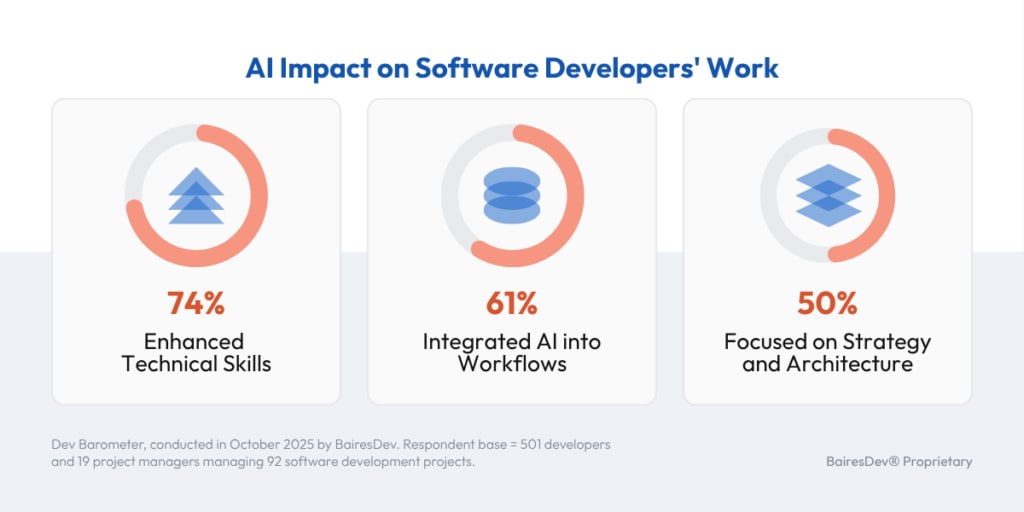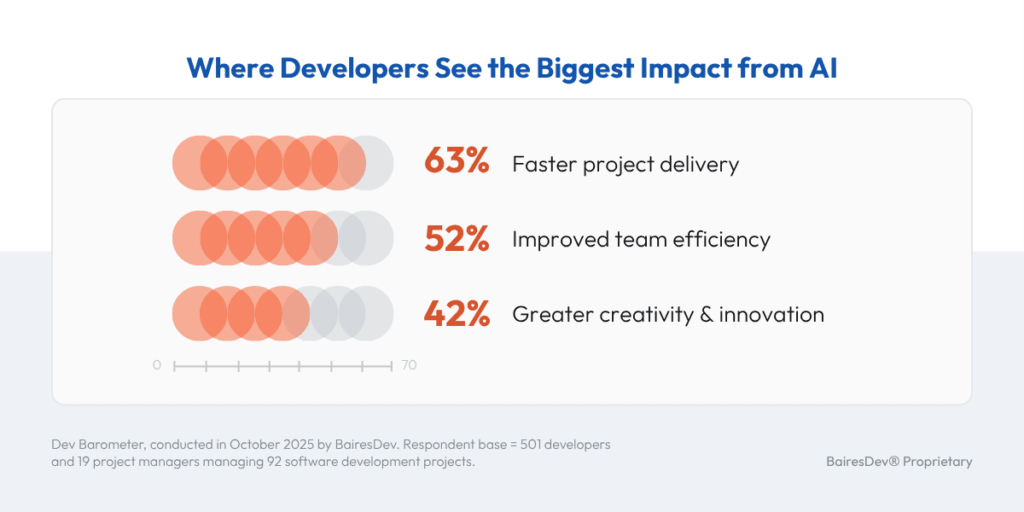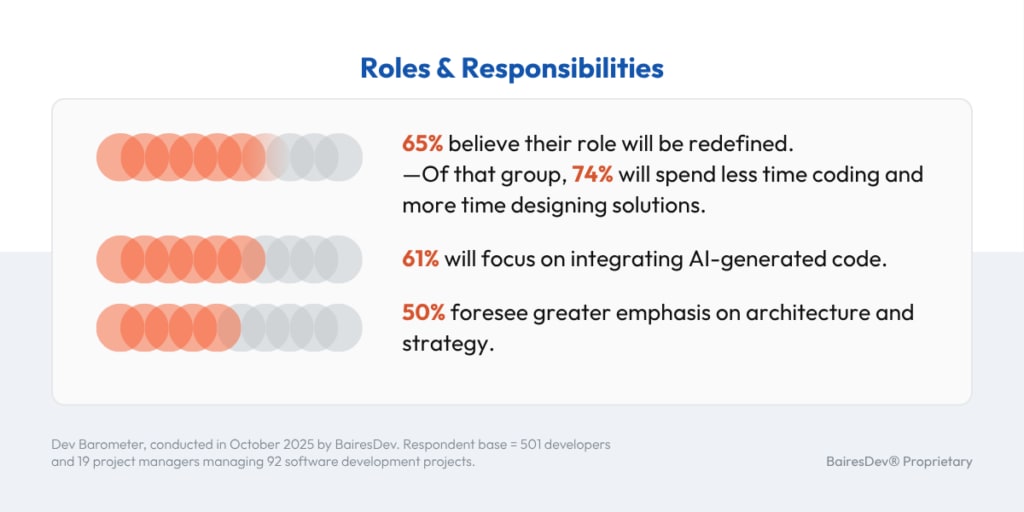Our Dev Barometer Q4 marks 2025 as the year AI ceased to be perceived as a threat to developers and emerged as a catalyst for their productivity and career growth. Moreover, our latest edition highlights how developers are redefining software work, moving from code producers to solution designers, AI orchestrators, and strategic copilots. Their evolution offers a preview of how highly-skilled workers everywhere will collaborate with AI next.
The second edition of the Dev Barometer collected responses from over 520 developers and project managers across Fortune 500s and SMBs, across 40 countries. It explores how developers are mastering human–AI collaboration, reinventing their roles, and setting the pace for every highly-skilled worker to follow. Access the full data breakdown here
For a broader view of this transformation, we’ve combined the findings from both the Q3 and Q4 editions into our Dev Barometer 2025 white paper—a complete picture of how AI is reshaping software work and career growth across the industry.
In this article, though, we’ll focus specifically on the latest Q4 findings.
AI Expanded Career Opportunities for 4 in 10 developers in 2025
Developers aren’t being replaced; they’re being enhanced. At the start of 2025, developers feared AI would automate them out of relevance. By year’s end, they had become its most valuable collaborators.
The Q3 survey already revealed that 9 in 10 devs say AI makes their work better. However, in Q4 we see a clearer representation of the benefits. A significant 74% of respondents credit it with sharpening their technical skills, followed by integrating AI into workflows (61%) and focusing on strategy and architecture (50%). Half also report better work-life balance, a sign that automation, when applied thoughtfully, can enhance the human side of work.
Four in ten developers say AI expanded their career opportunities in 2025, proof that AI is a springboard for professional growth. With repetitive coding off their plates, they’re using AI to test ideas faster and solve problems more creatively. That constant exchange between human direction and machine execution is redefining how work itself evolves.

63% of Developers Report Faster Project Turnaround
AI-powered projects now bring both quantitative and qualitative gains. Among them, 63% of devs highlight accelerated project delivery, 52% report higher team efficiency, and 42% credit AI with sparking greater innovation. Tasks once dominated by debugging and boilerplate code are giving way to system design, auditing, and orchestration.
While developers still spend most of their time writing code (48%), debugging (42%), and planning (35%), the nature of that work is changing. Although only 19% mentioned they focus on problem-solving, this figure is expected to grow as AI continues to automate routine coding tasks.
Instead of asking how to code something, developers now ask what should be built and how AI can help shape it, just as knowledge workers everywhere rethink how they create with AI.

Over Half of Developers Trust AI—Just Not Enough to Ship Without Checking
Even as AI boosts performance, developers are keeping a healthy dose of skepticism. More than half (56%) describe AI-generated code as “somewhat reliable”, useful, but not ready to ship without review. Another 36% report better overall code quality thanks to AI, while 22% note new risks and complexity introduced by its use.
That tension is exactly what keeps progress grounded. Developers are acting as copilots rather than passengers, testing and refining AI output to ensure quality, security, and ethics hold steady. It’s a reminder that human judgment remains the ultimate debugging tool.
With the many advantages brought on by AI, more than half (51%) respondents warn that professionals without AI skills risk falling behind. The faster AI evolves, the more AI skills and continuous learning become part of the job description for many tech professionals and beyond, with developers already leading by example.
Two-Thirds of Developers Expect Their Role to be Redefined in 2026
Developers are well aware of how fast their roles are evolving, with 65% of them expecting it to be redefined in 2026. Of those, 74% anticipate spending less time coding and more time designing solutions. Sixty-one percent expect to integrate AI-generated code into their workflows, and 50% foresee a greater focus on strategy and architecture.

Developers are also forecasting structural change within tech teams. Sixty-three percent expect entirely new career paths to emerge, nearly six in ten (59%) predict that AI will create new specialized roles in 2026, and 58% anticipate that automation will reduce entry-level tasks, resulting in smaller, leaner teams.
For early-career developers in particular, expectations are shifting. Twenty-four percent foresee these roles demanding stronger analytical and AI-assisted coding skills, while another 24% anticipate new opportunities fueled by AI-driven products and markets.
Across the broader workforce, developers unsurprisingly identify AI and machine learning (67%), data analytics (46%), and cybersecurity (45%) as the fastest-growing fields for 2026. Project managers agree, with 42% pointing to AI/ML specialists as the most pressing talent gap for the year ahead. Prompt engineers follow with 16%, and data engineers with 11% of responses.
Developers Are Leading the Way Toward an AI-Native Workforce
What started as uncertainty has become a roadmap for progress. Developers showed that when human expertise and AI evolve together, work becomes more strategic, creative, and connected.
Their evolution points to what’s next for every knowledge worker: deeper specialization, smaller and more agile teams, and a constant need to learn. Developers are setting the standard for how humans and AI can work together.
As 2026 unfolds, the Dev Barometer will continue to report on their journey, offering clues about how talent and technology can grow together. It’s a story of turning disruption into design for the future of work.
View the complete Q4 survey breakdown here or read the full Dev Barometer white paper 2025 to explore the full story on how developers are shaping the AI-native enterprise.






